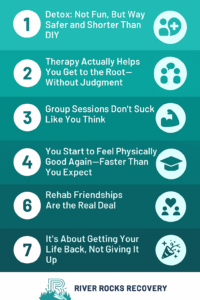It’s Not a Sentence—It’s a Shortcut to Freedom
If you’ve ever thought, “Do I really need rehab? I’m not that bad,” you are absolutely not alone. I told myself that for years. Rehab seemed like this big, dramatic step for people who had “really hit bottom,” whatever that means. But here’s what I learned: alcohol rehab treatment isn’t a punishment—it’s a fast track out of feeling stuck, drained, and constantly battling your own brain.
If you’re sober curious, rehab isn’t some last resort—it’s a break from the constant cycle, a place where you can clear your head and build a life that doesn’t revolve around recovery slogans or counting days. Here’s the honest version of what happens inside alcohol rehab—and why it’s nowhere near as terrifying as people make it out to be.
1. Detox: Not Fun, But Way Safer and Shorter Than DIY
Let’s get real about detox. Yes, your body has to adjust to life without alcohol. That part can feel rough, especially if you’ve been drinking regularly for a while. But here’s the thing: in alcohol rehab treatment, you don’t go through it alone. You have medical staff checking on you, making sure you’re hydrated, giving you medication if needed, and basically helping you not spiral into a panic.
Most people get through the worst in a few days, not weeks. You get to rest, reset, and survive it safely—without the kitchen floor breakdowns or 3am freak-outs.
2. Therapy Actually Helps You Get to the Root—Without Judgment
This part surprised me the most. I thought therapy would be this heavy, cry-in-front-of-strangers thing. But honestly? It’s the part that helped me understand why I was drinking the way I was. In alcohol rehab treatment, you talk about stress, self-worth, relationships—whatever your triggers are.
And it’s not just talking. You actually learn how to deal with things in a way that doesn’t involve a bottle or shot glass. Plus, nobody’s judging you. Everyone around you gets it because they’ve been there too.
3. Group Sessions Don’t Suck Like You Think
I used to roll my eyes at the idea of group therapy. Turns out? It’s one of the most healing parts. It’s the first time you get to say out loud, “Hey, this isn’t working for me,” and hear a room full of people say, “Yep, been there.” You laugh together, vent together, and some of those people turn into real friends who understand the part of your story you’ve never told anyone else.

4. You Start to Feel Physically Good Again—Faster Than You Expect
Alcohol wipes you out. Energy, sleep, digestion, even your skin—everything takes a hit. What nobody tells you is how quickly your body starts bouncing back when you stop drinking. In rehab, you get regular meals, decent sleep, and a break from stress. Suddenly your head isn’t foggy, your heart doesn’t race all the time, and you remember what it feels like to wake up without dread.
By week two, I actually felt like a human again—not just a shell going through the motions.
5. You Learn How to Stay Sober in Real Life—Not Just in Rehab
This was the game changer. I didn’t want to get sober and be terrified of social events or vacations forever. In rehab, you don’t just get through withdrawal—you learn how to handle cravings, stress, parties, and awkward family dinners without sliding backward.
Rehab helps you practice sober life, not just survive it.
6. Rehab Friendships Are the Real Deal
You’re not making party friends—you’re making survival friends. People who see you at your worst and cheer for you anyway. People who laugh about the hard stuff and celebrate the small wins. I left rehab with more than a clear head—I left with people I still check in with, people who get me in a way nobody else does.
7. It’s About Getting Your Life Back, Not Giving It Up
Here’s the best-kept secret: Alcohol Rehab Treatment in Middletown, Ohio doesn’t make your life smaller. It makes it bigger. You stop wasting time on hangovers and regret. You stop calculating when you can drink again. You stop feeling like you’re faking it. You get your mornings back, your ambition back, your self-respect back.
Life doesn’t get boring—it gets brighter.
FAQs About Alcohol Rehab Treatment
1. How long is alcohol rehab treatment?
It depends on your needs. Many people start with 30 days, but some choose longer programs like 60 or 90 days. River Rocks Recovery also offers outpatient options if you need more flexibility.
2. Do I have to share personal stories in group therapy?
Nope. You can share as much or as little as you want. There’s no pressure to spill everything. People usually find it easier to open up when they realize they’re not being judged.
3. Can I leave rehab if I change my mind?
You’re not held hostage. Rehab is voluntary, and you can leave. But most people stick it out once they see how much better they start feeling.
4. What happens after rehab?
River Rocks Recovery helps you build a plan for aftercare. That might include outpatient therapy, sober housing, support groups, or individual counseling—whatever helps you stay on track.
5. Is rehab only for people with “severe” drinking problems?
Absolutely not. If drinking is making your life smaller—or making you feel worse than you want to admit—you qualify. Rehab is for anyone who wants to feel better, period.
6. Will I lose my job if I go to rehab?
Many people use FMLA (Family Medical Leave Act) or medical leave protections to go to rehab. You don’t have to explain details to your employer. River Rocks Recovery can help you navigate this.
Want to Know What Feels Better Than a “Fresh Start” Monday?
Not needing a “reset” every Monday. Not needing to hit the pause button because your weekends wrecked you. Not needing to explain to yourself, “It wasn’t that bad.”
Alcohol rehab treatment isn’t just for crisis—it’s for anyone ready to stop feeling half-alive. If you’ve been wondering if this could be your way out… it absolutely can be.
Call (888) 905-6281 to see how good life can feel when you don’t have to recover from your own choices.




























